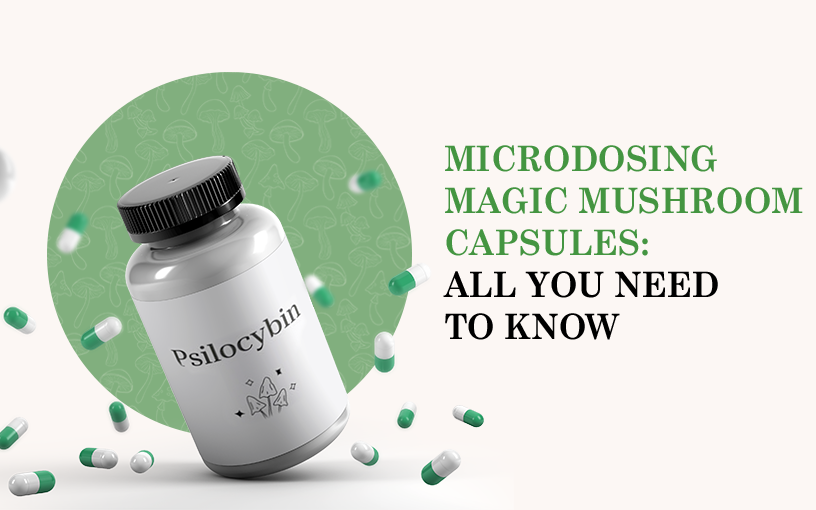Magic mushrooms are recognized for their powerful psychoactive substance, psilocybin, which can trigger profound, mind-altering experiences. While these intense effects are desired by some, they can be harmful to others, especially those with susceptibilities in mental health.
In response to the risks associated with consuming psychedelics in standard doses, about 22% of individuals turned towards microdosing in 2021. Microdosing refers to consuming very small doses of magic mushroom capsules aimed at reaping the cognitive advantages of psilocybin while avoiding the overwhelming effects of a complete psychedelic experience.
That said, let’s explore this guide that provides a comprehensive insight into why microdosing psilocybin is seen as a preferable alternative, along with other essential details.
Key Takeaways
- Microdosing involves taking small doses of magic mushroom capsules to gain cognitive benefits without full psychedelic effects.
- The benefits of microdosing psilocybin include reduced anxiety, enhanced spiritual awareness, improved mood, increased focus, etc.
- Start with 0.1 to 0.5 grams of magic mushrooms, adjust based on effects, and follow a specific dosing schedule.
- Microdosing aims to achieve sub-perceptual effects, not a high effect.
- Scheduling protocols include Fadiman, Microdosing Institute, Two-Days-a-Week, Stamets Stack, Nightcap, etc.

Microdosing Magic Mushroom Capsules: An Overview
Microdosing magic mushroom capsules involves taking doses that are too small to cause hallucinations, yet they potentially enhance focus and creativity. This emerging trend captivates those seeking natural wellness alternatives.
However, it’s crucial to consider the legality and health impacts of psilocybin carefully, as research on it is still limited.
Why Go for Microdosing Psilocybin?
Psilocybin, the active compound in magic mushrooms, offers potential mental health benefits, like better emotional health, enhanced creativity and focus, improved sensory perception, etc. However, its side effects usually outweigh the advantages when taken in usual doses.
To avoid this, advocates suggest that microdosing psilocybin can help minimize the potent consequences of this substance on mental health. Furthermore, early research indicates its potential in alleviating symptoms of depression and anxiety, suggesting a therapeutic angle.
Top Benefits of Microdosing Magic Mushroom Capsules
Let’s expand on the advantages of using magic mushroom capsules in micro doses:
1. Enhanced Mood and Emotional Well-Being
Magic mushroom capsules may elevate mood, reducing symptoms of depression and anxiety by modulating serotonin activity. This claim is further strengthened by a study that surveyed 1,102 individuals who have had experience with microdosing psychedelics.
Here are the findings of the study:
- 21% of the people in the study used microdosing mainly as a treatment for depression.
- 7% went for it to reduce anxiety levels.
- 9% microdosed to address other mental health conditions.
- 2% used it to either stop or reduce substance use.
- Impressively, 44% of the participants felt that their mental health significantly improved due to microdosing.
2. Increased Creativity, Focus, and Productivity
Users often associate microdosing psilocybin with a boost in creativity, problem-solving abilities, and open-mindedness due to its impact on brain connectivity. Also, a qualitative report from the Journal of Humanistic Psychology suggests that microdosing can enhance cognitive flexibility, aiding creative thinking.
Other than this, some people go this route as it helps them experience heightened focus and productivity. They report feeling more energized, mentally clear, and emotionally balanced, which can increase productivity in their professional and personal lives.
3. Reduced Symptoms of Post Traumatic Stress Disorder (PTSD)
Microdosing has shown promising results in preliminary research for reducing symptoms of PTSD. This approach is believed to facilitate neural plasticity, potentially aiding in the recovery from traumatic experiences.
Meanwhile, the Multidisciplinary Association for Psychedelic Studies (MAPS) is actively conducting further research to explore and validate the therapeutic potential of psychedelics in treating traumatic disorders.
4. Enhanced Spiritual Awareness
Magic mushroom capsules are frequently reported to enhance spiritual and philosophical insights. These experiences, often described as profound and life-changing, can lead to increased personal development and self-awareness.
Users often report a heightened sense of connection to the world, a deeper understanding of themselves, and a reevaluation of their life’s purpose. Such experiences could potentially lead to long-lasting positive changes in attitudes, values, and overall mental well-being.

How Much Should You Take When Microdosing Magic Mushroom Capsules?
Microdosing magic mushroom capsules involves taking a significantly reduced amount of dried mushrooms or mushroom powder, typically ranging from 0.1 to 0.5 grams. This dosage represents about one-tenth to one-fifth of a standard recreational dose, which is usually around 2 to 3 grams.
However, the ideal dosage varies among individuals and depends on factors like body weight and personal physiology. It’s generally recommended to start with a very small amount, such as 0.1 grams, and gradually increase it. Once you begin to notice psychedelic effects, you should slightly decrease the dosage to the previous amount.
Remember, the goal of microdosing is not to produce a noticeable high effect but to achieve subtle, therapeutic benefits.
Schedule for Microdosing Psilocybin
Microdosing involves taking small, non-hallucinogenic amounts of psilocybin, the active ingredient in magic mushrooms. This process is done according to different protocols, each with its own distinct timing and methodology.
Here’s an overview of these varied schedules and approaches:
- Fadiman Protocol: Named after Dr. James Fadiman, this popular regimen involves a 3-day cycle: one day of microdosing, followed by two days off. This is typically followed for 4 to 8 weeks, continued by a 2 to 4 week rest period.
- Microdosing Institute Protocol: Suitable for addressing specific medical or psychological conditions, this protocol involves microdosing every second day, with a day of transition in between. Like the Fadiman Protocol, it also recommends a 4 to 8-week cycle with a subsequent 2 to 4-week break.
- Two-Days-a-Week Protocol: This approach is tailored for those preferring a fixed weekly schedule. For it, you have to microdose on two specific days each week, ensuring at least one non-microdosing day between. It also follows a 4 to 8-week cycle, with a break afterwards.
- Stamets Stack Protocol: Developed by Paul Stamets, this involves a combination of psilocybin, niacin, and Lion’s Mane mushroom. The schedule is slightly different, with 4 days of microdosing followed by 3 days off in a 4-week cycle, after which you can take a break.
- Nightcap Protocol: This schedule is suitable for you if you experience fatigue while microdosing. It involves taking a microdose every second day before bedtime and follows the same 4 to 8-week cycle with a rest period.
- Intuitive Microdosing: It is a more flexible approach, allowing individuals to microdose based on intuition while maintaining at least one day off between doses. It’s often adopted by those who have experienced other protocols.
Each of these protocols has its unique rhythm and is chosen based on individual preferences, goals, and responses to microdosing. Moreover, the rest period is crucial to prevent tolerance and sustain the benefits of microdosing.
Tips for Consuming Microdosing Psilocybin
Here are some tips to follow if you plan to consume magic mushroom capsules:
- Before considering microdosing psilocybin, check its legal status in your area. The substance is banned in many places, and penalties can be severe.
- Read up on psilocybin and its effects, both at micro and regular doses. You must understand the potential risks before including psilocybin in your daily diet.
- Ensure the source of the mushroom is reliable, as impurities can be harmful to your health. If possible, consider testing the substance for purity.
- If the initial dose doesn’t produce the desired effects, slightly adjust the amount, staying within a low range.
- Record your experiences, noting changes in well-being, cognition, or sensory perception.
FAQs
How long do the effects of magic mushrooms last?
The effects of magic mushroom capsules generally last around 6 hours. After the peak effects diminish, you might still experience some residual effects for several more hours. The duration can vary depending on factors such as the dosage taken and individual physiological differences.
Are there any potential drug interactions associated with magic mushrooms?
The effects of magic mushroom capsules generally last around 6 hours. After the peak effects diminish, you might still experience some residual effects for several more hours. The duration can vary depending on factors such as the dosage taken and individual physiological differences.
Are there any potential drug interactions associated with magic mushrooms?
Magic mushroom capsules may interact with various medications, particularly antidepressants, anti-anxiety medications, and stimulants. It’s important to exercise caution and consult a healthcare professional before combining them with these or any other drugs to ensure safety.
Do microdosing magic mushroom capsules have any side effects?
As for the side effects of microdosing mushroom capsules, common ones include nausea, anxiety, jitteriness, and difficulty sleeping, especially if taken late in the day. In some cases, high dosage can lead to mild visual changes or a feeling of being too altered to focus on tasks.
How risky are microdosing Psilocybin mushrooms to use?
Classic psychedelics like psilocybin are generally considered among the safest drugs, with a low risk of addiction and minimal direct physiological harm. While current evidence doesn’t indicate significant concern, continuous use over long periods could potentially affect heart health, a question that remains open for further research and understanding.





